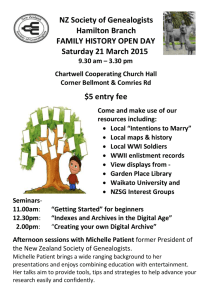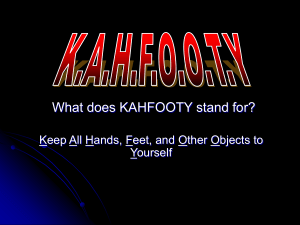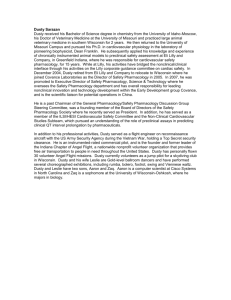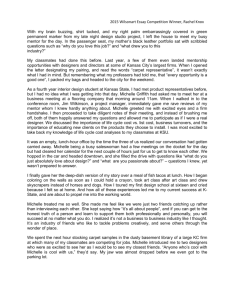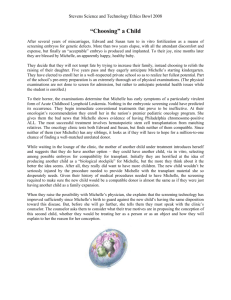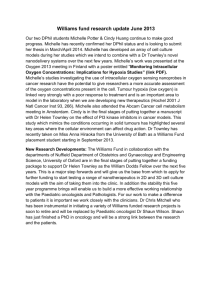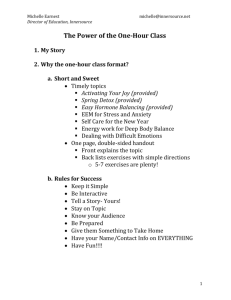JAMS Magazine DUSTY ROADS
advertisement
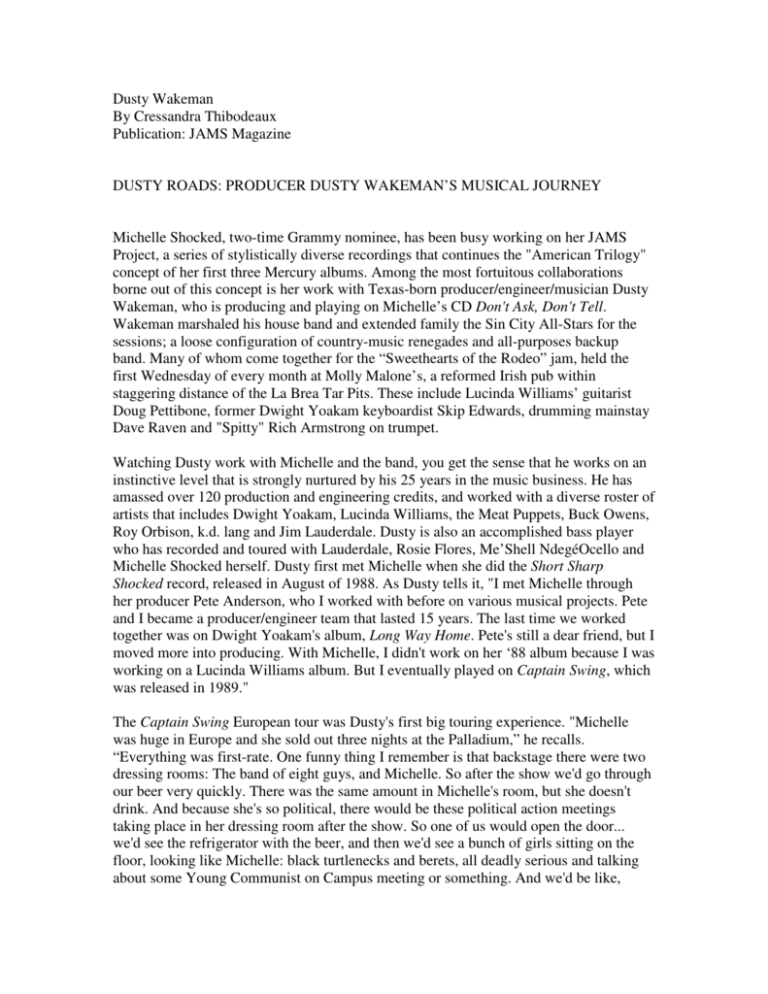
Dusty Wakeman By Cressandra Thibodeaux Publication: JAMS Magazine DUSTY ROADS: PRODUCER DUSTY WAKEMAN’S MUSICAL JOURNEY Michelle Shocked, two-time Grammy nominee, has been busy working on her JAMS Project, a series of stylistically diverse recordings that continues the "American Trilogy" concept of her first three Mercury albums. Among the most fortuitous collaborations borne out of this concept is her work with Texas-born producer/engineer/musician Dusty Wakeman, who is producing and playing on Michelle’s CD Don't Ask, Don't Tell. Wakeman marshaled his house band and extended family the Sin City All-Stars for the sessions; a loose configuration of country-music renegades and all-purposes backup band. Many of whom come together for the “Sweethearts of the Rodeo” jam, held the first Wednesday of every month at Molly Malone’s, a reformed Irish pub within staggering distance of the La Brea Tar Pits. These include Lucinda Williams’ guitarist Doug Pettibone, former Dwight Yoakam keyboardist Skip Edwards, drumming mainstay Dave Raven and "Spitty" Rich Armstrong on trumpet. Watching Dusty work with Michelle and the band, you get the sense that he works on an instinctive level that is strongly nurtured by his 25 years in the music business. He has amassed over 120 production and engineering credits, and worked with a diverse roster of artists that includes Dwight Yoakam, Lucinda Williams, the Meat Puppets, Buck Owens, Roy Orbison, k.d. lang and Jim Lauderdale. Dusty is also an accomplished bass player who has recorded and toured with Lauderdale, Rosie Flores, Me’Shell NdegéOcello and Michelle Shocked herself. Dusty first met Michelle when she did the Short Sharp Shocked record, released in August of 1988. As Dusty tells it, "I met Michelle through her producer Pete Anderson, who I worked with before on various musical projects. Pete and I became a producer/engineer team that lasted 15 years. The last time we worked together was on Dwight Yoakam's album, Long Way Home. Pete's still a dear friend, but I moved more into producing. With Michelle, I didn't work on her ‘88 album because I was working on a Lucinda Williams album. But I eventually played on Captain Swing, which was released in 1989." The Captain Swing European tour was Dusty's first big touring experience. "Michelle was huge in Europe and she sold out three nights at the Palladium,” he recalls. “Everything was first-rate. One funny thing I remember is that backstage there were two dressing rooms: The band of eight guys, and Michelle. So after the show we'd go through our beer very quickly. There was the same amount in Michelle's room, but she doesn't drink. And because she's so political, there would be these political action meetings taking place in her dressing room after the show. So one of us would open the door... we'd see the refrigerator with the beer, and then we'd see a bunch of girls sitting on the floor, looking like Michelle: black turtlenecks and berets, all deadly serious and talking about some Young Communist on Campus meeting or something. And we'd be like, 'Excuse me, Michelle,' and we'd tippytoe through them to get to the beer. And they'd be looking at us with darts in their eyes, like 'Guys!' Each night we'd take turns who'd go in." After 16 years of owning and operating Mad Dog Studios in Venice, California, Dusty relocated the facility in ’96 to an impressive 6,000-square-foot space in Burbank. The equipment is state-of-the-art, while the decor has a laidback Austin feel. The small Zenlike garden outside and funky Southwest interior was designed by his wife, Szu, a talented set decorator. "I started Mad Dog in 1980 in Venice,” Wakeman says. “At the time, I was into hard rock and punk. Monday through Friday, we'd work with Enigma Records, one of the first cool indie labels. During that time, they produced a great compilation called A Town South of Bakersfield. A few of the artists on it were Dwight Yoakam, Rosie Flores and Maria McKee." That's when I met Pete Anderson, he was Dwight's guitar player. We worked together on Dwight Yoakam's first album." Dusty's deep love of music coupled with his family's diverse musical background has given him a sensitivity that allows him to transcend genre. "My grandfather was a musician," he proudly admits. "He was a Dixieland banjo player during the Great Depression. He worked at a Houston mill, but when they closed down the mill, he supported his family by playing banjo. When he died I got his old banjo." Dusty's grandmother on his father's side was a classically trained concert pianist. Even his mother had a passion for music. "My mother managed a band in Fort Worth when I was ten years old,” he says. “So, I was at all the shows. They were a Beatles’ cover band." His hazel eyes sparkle as he remembers, "My first album was the Beach Boys’ live album; that was right before the Beatles came on, and then once the Beatles came on it was Beatles, Stones and Yardbirds." At one time, Dusty thought of himself as a songwriter – at least up until the mid-'80s when he started working with great songwriters like Lauderdale, Lucinda Williams and Michelle Shocked. "I realized I didn't have the same gift they had,” he says. “Once I learned what that really was, I realized what I do best, and that's helping other people behind the scene: producing, engineering, playing bass -- the supporting roles." It only took four days for Dusty to produce Don't Ask, Don't Tell. He describes the working process as a fourday lovefest. "It just happened very organically,” he says. “And that's because I've worked with these people for years. With two songs of Michelle's she had the lyrics but I put the music together for her. Because everyone was extremely talented and we know each other, it made my job as a producer much easier.” Dusty has become something of a mainstay in the Americana, country and roots-rock movements. Lately, he's been spearheading three new albums that highlight up-and-coming singersongwriters. "I'm producing Anne McCue's second album,” he says. “She's an Australian singer-songwritergunslinger. And the reason I say 'gunslinger' is because she's a bad-ass electric guitar player. On this eclectic albumu, she does an amazing rendition of Jimi Hendrix's 'Machine Gun.' She's also working on Michelle's next project, the Memphis Minnies. Another new talent I'm working with is Tim Easton. Yesterday we went into the studio and cut four tracks. I would describe Tim's style as more folk-rock. And presently I'm shopping for a label deal for Bobby Joyner's CD, which I also produced. He's a soulful singer from Mississippi." Dusty recognizes his luck at being able to work with so many great artists. He's surprised he's lasted this long in an industry that seems obsessed with the latest fads, and credits his belief in never taking the process for granted. Another musical collaboration Dusty helps out on is the Gram Parsons tribute “The Cosmic American Music Festival," hosted by the Sin City All-Stars every September locally vs. in Joshua Tree in the California High Desert, where Parsons famously spent his downtime and tragically died in 1973. "Gram Parsons was a big influence on me,” Wakeman says. “I loved when Parsons played with the Byrds on their album Sweethearts of the Rodeo. I guess one of the biggest moments at the last Gram Parsons tribute was when I played ”Wild Horses” on stage with Keith Richards. That was amazing. Keith and Gram were best friends. What's also great is that Polly Parsons, Gram's daughter, is partners with Sin City, and we held events in Santa Barbara and at the Universal Amphitheater. Other folks who performed were Nora Jones, Dwight Yoakam and Lucinda Williams.” When asked about Michelle Shocked’s three new CDs which are coming out simultaneously, Dusty pauses and responds, "She's about to kick some major ass. She's extremely focused. I think she's ready to jumpstart her career. I mean, she works all the time, and she always has an audience, but I think a broader audience is about to rediscover her."

